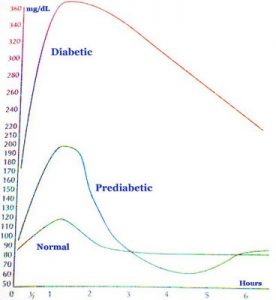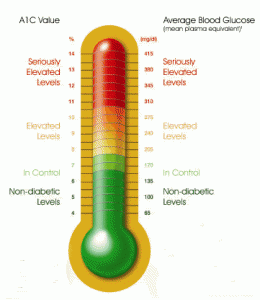What is elevated blood glucose?

Do you have diabetes and suffer from an elevated blood glucose? What is elevated blood glucose?
Many people who are diabetics suffer from an elevated blood glucose level because as your body adjusts to new medications, insulin, etc. the levels of insulin and glucose that your body is able to make will react differently to each other causing them to work harder.
A healthy glucose level means that your body is running and working smoothly and all parts of your body is working well with each other so that you can have a healthy glucose level. When you are diabetic or have any type of medical history or family history you need to keep careful tabs on your blood pressure and cholesterol levels as well as your blood glucose levels so that none of them get elevated.
Elevated blood glucose, elevated blood pressure and elevated cholesterol levels all gone unchecked or untreated can cause many major medical problems such as organ and system failure, heart attacks, stroke and even death.
Being a diabetic and having elevated blood glucose levels are only the beginning of a world wind of events that can occur being a diabetic. Elevated blood pressure can lead to strokes or heart attacks caused by restricted blood vessels and elevated cholesterol levels can lead to stroke, lightheaded, fainting and death if not treated or taken care of when first caught. Many people take elevated blood pressure, elevated cholesterol and elevated blood glucose levels lightly and normally end up finding out the hard way or dealing with near death experiences before they realize how serious elevated blood glucose levels and elevated blood pressure can be.
Are you a diabetic, do you suffer from elevated blood pressure, elevated cholesterol or elevated blood glucose or are you one of the few who has a healthy glucose?



 Hemoglobin is a protein based, iron containing component in red blood cells that is primarily responsible for carrying oxygen from the lungs and transferring it around the body to be used by the cells. Glucose also binds to some hemoglobin and stays bound to it for the length of the life of the red blood cells which is about 120 days.
Hemoglobin is a protein based, iron containing component in red blood cells that is primarily responsible for carrying oxygen from the lungs and transferring it around the body to be used by the cells. Glucose also binds to some hemoglobin and stays bound to it for the length of the life of the red blood cells which is about 120 days.
 These days’ people are more aware of their health than ever, and for an ever increasing number of people maintaining healthy blood glucose levels can be a matter of life and death. Even as death and disabilities from cancer, stroke, and heart disease decreases the number of people diagnosed with diabetes continues to grow each year. Diabetes is a metabolic disorder in which the body is either producing insufficient quantities of the hormone insulin which regulates healthy blood glucose levels or the cells of the body have developed a resistance to the action of the insulin which is produced.
These days’ people are more aware of their health than ever, and for an ever increasing number of people maintaining healthy blood glucose levels can be a matter of life and death. Even as death and disabilities from cancer, stroke, and heart disease decreases the number of people diagnosed with diabetes continues to grow each year. Diabetes is a metabolic disorder in which the body is either producing insufficient quantities of the hormone insulin which regulates healthy blood glucose levels or the cells of the body have developed a resistance to the action of the insulin which is produced.